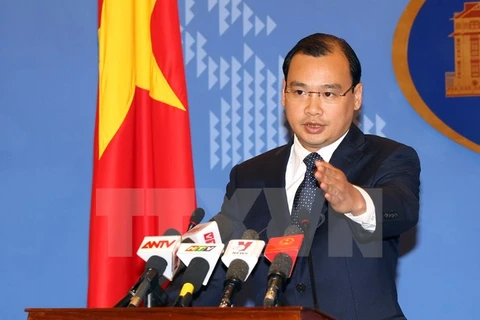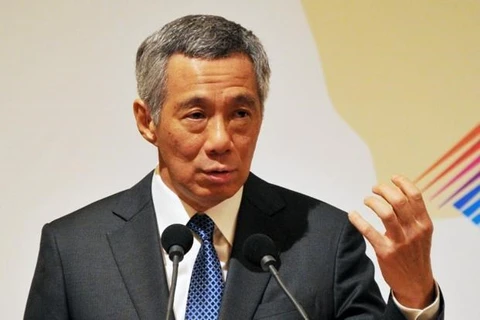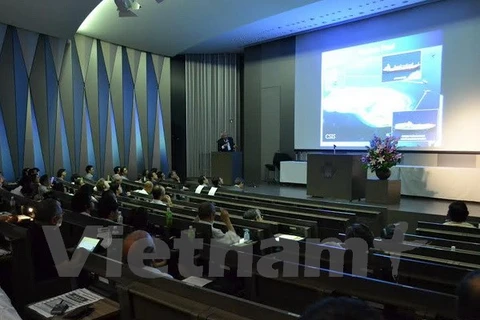China’s illegal construction work in the East Sea has adverse impacts on peace, security, economy, trade and marine environment, experts stressed at an international seminar in Ho Chi Minh City on July 25.
At the function that attracted over 200 domestic and foreign experts, Prof. Dr Mai Hong Quy, Rector of the Ho Chi Minh City University of Law, said maintaining an environment of stability, cooperation and development in Asia-Pacific in general and the East Sea in particular is critical to ensuring peace and maritime and aviation security and freedom. It is also an obligation, responsibility and aspiration of countries in the region and the world.
However, problems concerning the East Sea situation have arisen due to different viewpoints, stances and territory claims by some regional countries. Notably, after positioning an oil rig in Vietnam’s exclusive economic zone and continental shelf, China has conducted large-scale construction of artificial islands at seven places in Vietnam’s Truong Sa (Spratly) archipelago, he said.
Experts said although political viewpoints and responses towards the artificial island construction vary among countries, negative influences of this action on peace, security, economy, trade, marine and aviation freedom and marine environment will directly affect all countries around the globe.
Assoc. Prof. and Dr Nguyen Ba Dien, Chairman of the board of Vietnam’s Scientific Research Institute of the Sea and Islands, said China’s building of artificial islands seriously violates the sovereignty, sovereign right and national jurisdiction of Vietnam and other countries and infringes principles of international law.
It creates a very deleterious precedent that one country brazenly flouts basic principles of international law and is ready to break international law, directly affecting maritime safety in the East Sea. That move also threatens security, peace, stability in the region and the world, destroys the environment and marine ecosystem, and causes long-term impacts on fishermen who have to depend on marine resources in the East Sea for their livelihood, he added.
Dr Pham Van Vo, Vice Dean of the Commercial Law faculty of the University of Law, said China’s construction of artificial islands negatively influences the marine environment, ecosystem and biodiversity and breaches the International Environmental Law.
That action also runs counter to the spirit of principle 2 of the Stockholm Declaration as well as principle 7 of the Rio De Janeiro Declaration on environment and development.
On the other hand, the destruction of coral reefs and its impacts on marine ecosystem flout the duty of environmental protection under Article 192 and 193 of the 1982 United Nations Convention on the Law of the Sea (UNCLOS), Vo emphasised.
He noted that China also infringes the obligation of environmental protection cooperation, especially in providing due notice of influences on the environment of artificial island construction as stipulated in Articles 197, 198, 199, 200 and 201 of the UNCLOS.
Prof. Dr Jay L. Batongbaca from the University of the Philippines College of Law said the construction through land reclamation will completely destroy the habitat of coral reefs and damage the marine environment. The mass land reclamation by China is against this country’s obligation to preserve and protect the marine environment clearly specified in the UNCLOS.
The alarming speed of island reclamation and its enormous effects on the marine environment pose a direct challenge to solving equally and objectively disputes in the East Sea, the expert said.
At the seminar, participants also analysed negative impacts of China’s artificial island building on global peace, security, economy and trade, the country’s relations with other nations in the region and the world, and marine and aviation freedom at sea.
Vice Admiral Anup Singh, former Commander-in-Chief of the Indian Navy’s Eastern Naval Command, said amidst this context, the only way to bring about peace and stability is that all parties involving in disputes must seek justice through international jurisdiction institutions. ASEAN member nations also need to have a stronger common voice over this issue for the sake of the entire region.-VNA
Outstanding East Sea research works awarded
Outstanding research works on the East Sea in 2014 were honoured with awards from the Foundation for East Sea Studies (FESS) of the Diplomatic Academy of Vietnam in Hanoi on March 31.























